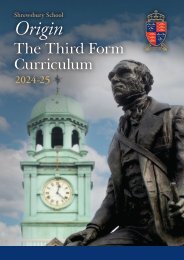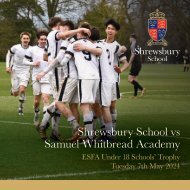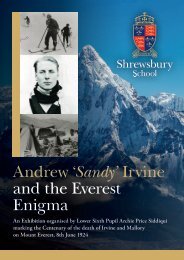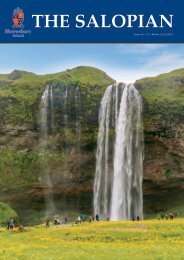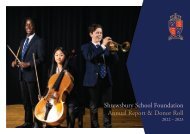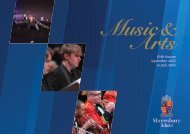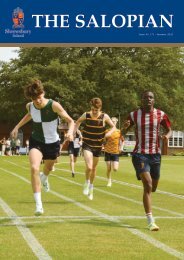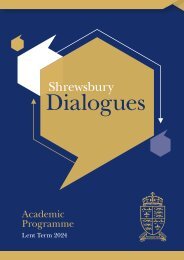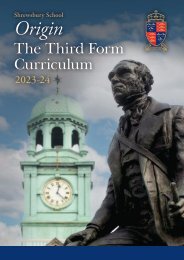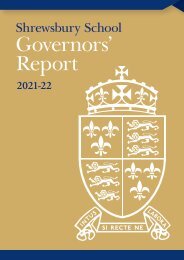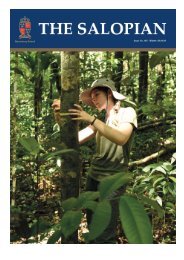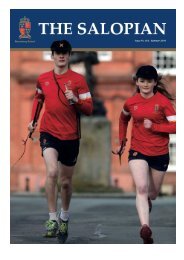The Salopian no. 157 - Winter 2015
Create successful ePaper yourself
Turn your PDF publications into a flip-book with our unique Google optimized e-Paper software.
80<br />
OLD SALOPIAN NEWS<br />
a solicitor in 1954, he spent the next thirty years as a<br />
conveyancing solicitor for the General Post Office and,<br />
after the split, British Telecom, commuting from Hampstead<br />
Garden Suburb (he could do a first-class impression of a<br />
Northern Line train) and later Colchester. He was respected<br />
as a hard-working and competent colleague.<br />
John Levetus spent his working life as a solicitor in<br />
London before retiring to Oxford. He never married but<br />
had strong ties with family and friends who remember<br />
him with much affection for his courtesy, quiet humour<br />
and remarkable memory.<br />
the company of his brother’s family nearby. He became a<br />
stalwart of the North Oxford Association community centre,<br />
serving on the management committee for more than<br />
twenty years and cheering up dull meetings with apt quotes<br />
from the masters of comic verse, and staffing the reception<br />
desk with characteristic patience and courtesy.<br />
In December 2014, John was admitted to hospital with<br />
problems walking, associated with sarcoma. He moved into<br />
a nursing home but became ill a few weeks later and died<br />
on 9th February <strong>2015</strong>.<br />
Retirement at the age of 60 brought John a new lease of life.<br />
He moved to Oxford to enjoy the cultural life of the city and<br />
Henry Oxenham (Ch 1943-47)<br />
A family tribute read at his funeral by his son, Hugh.<br />
My father was born on 13th April 1929 in Northfield, then<br />
a Worcestershire village <strong>no</strong>t yet engulfed by Birmingham.<br />
Both his parents came from Wales, his mother Gwyneth<br />
from the Vale of Clwyd and his father Bert from Aberdare.<br />
His father worked for a firm of Chartered Accountants in<br />
Birmingham. His sister Jane was born two years after him.<br />
At the outset of war he and his sister were evacuated to<br />
<strong>no</strong>rth Wales to live with their grandparents to escape the<br />
bombing of Birmingham. With the war still on and reaching<br />
the age of 13, his parents did <strong>no</strong>t want him to return to<br />
Birmingham so he was sent as a boarder to Shrewsbury<br />
School. He enjoyed his time at Shrewsbury for he was a<br />
keen and talented sportsman, playing soccer, cricket and<br />
athletics. He was good e<strong>no</strong>ugh at soccer to be selected for<br />
Public Schools soccer matches in London.<br />
After school he was called up for National Service in 1948<br />
and commissioned as a second lieutenant in the Royal<br />
Artillery. He had the good fortune to spend some of the<br />
time stationed in Gibraltar; it was an experience that made<br />
a big impression on him and in later life he would mention<br />
his time there, including hitch-hiking trips through Spain<br />
with friends.<br />
interest with my mother, was their involvement in the<br />
Birmingham Ramblers Association. Almost every week of<br />
the year, for many years, whatever the weather, they would<br />
travel with 50 or so other people by coach to a ramble and<br />
walk ten or twelve miles. He was the treasurer of the group<br />
for many years and led many walks, often recruiting me to<br />
help him carry out the reconnaissance of a new route.<br />
When his wife’s health declined and she had to have full<br />
time nursing care, she went to Horfield Lodge (nursing<br />
home) in Bristol so as to be near my sister Helen. My father<br />
sold the family home and moved to a flat in Bristol. He<br />
had been diag<strong>no</strong>sed with cancer but he then had a few<br />
good years in Bristol while the cancer was in remission. He<br />
became a volunteer helper at Horfield Lodge and engaged<br />
in various groups and activities with the University of the<br />
Third Age. He continued to pursue his great interest in<br />
history.<br />
When he became more unwell, he too moved into Horfield<br />
Lodge and finally into St Peter’s Hospice. My sisters and I<br />
would like to thank the staff at both places for the great<br />
kindness and care they gave to Henry in his final months.<br />
We believe he could <strong>no</strong>t have been anywhere better.<br />
He had an offer of a place at Clare College, Cambridge<br />
and after National Service he went there to read Eco<strong>no</strong>mics<br />
in 1949. After University he became an articled clerk in<br />
Birmingham, training to be a Chartered Accountant. He<br />
worked at various clients on audits – I remember him<br />
mentioning the big BSA factory in Small Heath and the<br />
British Rail works in Derby, then making the last the steam<br />
engines.<br />
In 1956 he married my mother Joan and they settled in a<br />
house in Selly Oak, Birmingham. <strong>The</strong>y had three children<br />
in the next few years – first my sister Susan, then me<br />
(Hugh) then my sister Helen. With a family he needed a<br />
less itinerant job, so in 1963 he took a job with a small<br />
manufacturing and civil engineering company at Tipton in<br />
the Black Country. He worked from then on for the same<br />
firm until he retired, <strong>no</strong>t unusual in those days.<br />
In retirement Henry became involved in the Housing<br />
Association movement. A<strong>no</strong>ther activity he loved, a shared



